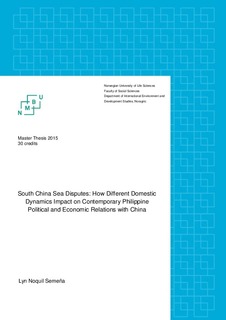| dc.description.abstract | The ongoing disputes in the South China Sea have gained international attention in the recent years as a number of bordering states continue to fight over territory and sovereignty claims of the contested Spratly Islands. China and the Philippines are among the claimant states whose foreign policy is largely driven by dynamics coming from the external environment. This study delves into issues concerning the role of domestic dynamics on the contemporary Philippine political and economic relations with China under the administrations of former President Gloria Macapagal-Arroyo (2001-2010) and current President Benigno S. Aquino III (2010-2016). This study argues that despite of the strong influence on the foreign policy choices, brought by national power and state’s position in the international system, domestic dynamics can also shape the Philippine foreign policy and its outcomes. President Arroyo’s friendly relationship with China is represented through bilateral diplomatic relations and economic partnerships, whereas the Aquino III’s “antagonistic” relationship with China is guided by geopolitics with US’ involvement and multilateral and legal strategy at the UN Tribunal. This qualitative study employs a method of textual analysis of data gathering. Among the main strategies used, include documentary research, news analysis, and reviewed scholarly works relevant for the topic of this study. Several materials like journals, newspaper articles, books, particularly about political economy, foreign policy and diplomacy, history, and social sciences have been collected from libraries, official documents and government websites. The theory of neoclassical realism guides the understanding of the problem of this study as it seeks to explain how, why and under what condition domestic dynamics shapes the foreign policy. The concept of security dilemma is used to describe the phenomenon under which states operate in the international system. This study concludes that the significant role of states’ domestic dynamics in any conflict management or resolution mechanisms should be highly considered because they can alter the balance of peace and stability in the international system. | nb_NO |

